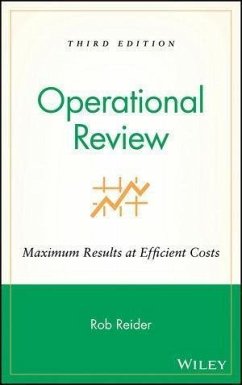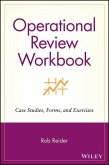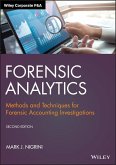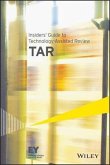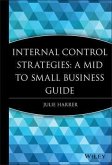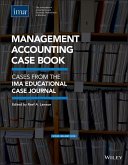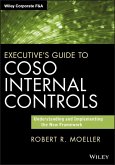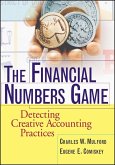118,99 €
118,99 €
inkl. MwSt.
Sofort per Download lieferbar

0 °P sammeln
118,99 €
Als Download kaufen

118,99 €
inkl. MwSt.
Sofort per Download lieferbar

0 °P sammeln
Jetzt verschenken
Alle Infos zum eBook verschenken
118,99 €
inkl. MwSt.
Sofort per Download lieferbar
Alle Infos zum eBook verschenken

0 °P sammeln
- Format: PDF
- Merkliste
- Auf die Merkliste
- Bewerten Bewerten
- Teilen
- Produkt teilen
- Produkterinnerung
- Produkterinnerung

Bitte loggen Sie sich zunächst in Ihr Kundenkonto ein oder registrieren Sie sich bei
bücher.de, um das eBook-Abo tolino select nutzen zu können.
Hier können Sie sich einloggen
Hier können Sie sich einloggen
Sie sind bereits eingeloggt. Klicken Sie auf 2. tolino select Abo, um fortzufahren.

Bitte loggen Sie sich zunächst in Ihr Kundenkonto ein oder registrieren Sie sich bei bücher.de, um das eBook-Abo tolino select nutzen zu können.
* Shows in a step-by-step manner how an operational review shouldbe conducted. * Demonstrates the differences between an operational andfinancial audit. * Details how to identify which organizational systems aredetrimental to a corporation's growth. * Shows how to judge the results and make recommendations tomanagement. * Provides blank and sample forms required for conducting acomprehensive operational review.
- Geräte: PC
- mit Kopierschutz
- eBook Hilfe
- Größe: 1.18MB
Andere Kunden interessierten sich auch für
![Operational Review Workbook (eBook, PDF) Operational Review Workbook (eBook, PDF)]() Rob ReiderOperational Review Workbook (eBook, PDF)76,99 €
Rob ReiderOperational Review Workbook (eBook, PDF)76,99 €![Forensic Analytics (eBook, PDF) Forensic Analytics (eBook, PDF)]() Mark J. NigriniForensic Analytics (eBook, PDF)76,99 €
Mark J. NigriniForensic Analytics (eBook, PDF)76,99 €![Insiders' Guide to Technology-Assisted Review (TAR) (eBook, PDF) Insiders' Guide to Technology-Assisted Review (TAR) (eBook, PDF)]() Ernst & Young LlpInsiders' Guide to Technology-Assisted Review (TAR) (eBook, PDF)19,99 €
Ernst & Young LlpInsiders' Guide to Technology-Assisted Review (TAR) (eBook, PDF)19,99 €![Internal Control Strategies (eBook, PDF) Internal Control Strategies (eBook, PDF)]() Julie HarrerInternal Control Strategies (eBook, PDF)46,99 €
Julie HarrerInternal Control Strategies (eBook, PDF)46,99 €![Management Accounting Case Book (eBook, PDF) Management Accounting Case Book (eBook, PDF)]() Management Accounting Case Book (eBook, PDF)19,99 €
Management Accounting Case Book (eBook, PDF)19,99 €![Executive's Guide to COSO Internal Controls (eBook, PDF) Executive's Guide to COSO Internal Controls (eBook, PDF)]() Robert R. MoellerExecutive's Guide to COSO Internal Controls (eBook, PDF)76,99 €
Robert R. MoellerExecutive's Guide to COSO Internal Controls (eBook, PDF)76,99 €![The Financial Numbers Game (eBook, PDF) The Financial Numbers Game (eBook, PDF)]() Charles W. MulfordThe Financial Numbers Game (eBook, PDF)24,99 €
Charles W. MulfordThe Financial Numbers Game (eBook, PDF)24,99 €-
-
-
* Shows in a step-by-step manner how an operational review shouldbe conducted. * Demonstrates the differences between an operational andfinancial audit. * Details how to identify which organizational systems aredetrimental to a corporation's growth. * Shows how to judge the results and make recommendations tomanagement. * Provides blank and sample forms required for conducting acomprehensive operational review.
Dieser Download kann aus rechtlichen Gründen nur mit Rechnungsadresse in A, B, BG, CY, CZ, D, DK, EW, E, FIN, F, GR, HR, H, IRL, I, LT, L, LR, M, NL, PL, P, R, S, SLO, SK ausgeliefert werden.
Produktdetails
- Produktdetails
- Verlag: John Wiley & Sons
- Seitenzahl: 394
- Erscheinungstermin: 4. November 2002
- Englisch
- ISBN-13: 9780471444831
- Artikelnr.: 37301422
- Verlag: John Wiley & Sons
- Seitenzahl: 394
- Erscheinungstermin: 4. November 2002
- Englisch
- ISBN-13: 9780471444831
- Artikelnr.: 37301422
- Herstellerkennzeichnung Die Herstellerinformationen sind derzeit nicht verfügbar.
ROB REIDER, CPA, MBA, PhD, is President of Reider Associates (Santa Fe, New Mexico), a management and organizational consulting firm. Prior to founding Reider Associates, he was a manager in the Management Consulting Group of Peat, Marwick, Mitchell Co. (now KPMG). He is the course author as well as seminar leader of over twenty workshops conducted nationally and is also the author of Benchmarking Strategies: A Tool for Profit Improvement and Improving the Economy, Efficiency, and Effectiveness of Not-for-Profits: Conducting Operational Reviews, both from Wiley. He can be contacted at hrreider@reiderassociates.com.
Preface. Chapter One: Overview of Operational Reviews. Operational Review
Concepts. Why Businesses Are in Existence. Businesses a Company Is Not In.
Some Basic Business Principles. Criteria for Organizational Growth. Mental
Models and Belief Systems. Organizational Criteria Example. Economy,
Efficiency, and Effectiveness. Definition. Terms. Financial Audits versus
Operational Reviews. Why Perform an Operational Review? Specific
Objectives. Specific Purposes. Benefits of Operational Reviews. Operational
Review Phases. What Functions to Review. Budget. Initial Survey. Engagement
Development. Chapter Two: Planning Phase. Planning Phase Overview.
Information to Be Obtained. Sources of Information. Review of
Organizational Planning and Budget Systems. Organizational Structure and
the Role of Management. Identification of Critical Problem Areas. Review of
Administrative and Operational Controls. Planning Phase Work Program.
Financial Statement Analysis. Identifying Critical Areas. Areas Not
Selected for Review. Conclusion. An Operational Review Case Example: The
Accounting Function. Chapter Three: Work Program Phase. Benefits of the
Operational Review Work Program. Operational Review Work Program Standards.
Who Develops the Work Program. Work Program Work Steps. Work Program
Development Procedures. Sample Work Program: Purchasing Function.
Operational Review Engagement Budget. Assignment of Staff. Operational
Review Management. Operational Review Schedule Control. Engagement Control.
Example Company Work Program Phase. Work Program to Field Work Phase.
Chapter Four: Field Work Phase. Field Work Considerations and Tasks.
Factors in Reaching Conclusions. Field Work Techniques. Specific Field Work
Techniques. Field Work: Example Company. Other Techniques. Work Papers.
Evidence. Identifying Items for Finding Development. Case Study: Mercy
College, a College Business Office. Chapter Five: Development of Review
Findings. Attributes of a Review Finding. Review Findings Development.
Identifying Attributes. Approach to Developing Review Findings. Review
Finding Development: Example Company. Developing Recommendations.
Recommendations through Internal Benchmarking. Recommendations through
External Benchmarking. Choosing a Benchmarking Approach. Benchmarking Data
Collection. Process Comparisons. Functional Cost Controls. Conclusion.
Chapter Six: Reporting Phase. Interim Reporting. Oral Reporting. Written
Report. Characteristics of Good Reporting. Reporting Review Findings. ABCs
of Effective Report Writing. Sample Reports. Conclusion. Afterword. Index.
Concepts. Why Businesses Are in Existence. Businesses a Company Is Not In.
Some Basic Business Principles. Criteria for Organizational Growth. Mental
Models and Belief Systems. Organizational Criteria Example. Economy,
Efficiency, and Effectiveness. Definition. Terms. Financial Audits versus
Operational Reviews. Why Perform an Operational Review? Specific
Objectives. Specific Purposes. Benefits of Operational Reviews. Operational
Review Phases. What Functions to Review. Budget. Initial Survey. Engagement
Development. Chapter Two: Planning Phase. Planning Phase Overview.
Information to Be Obtained. Sources of Information. Review of
Organizational Planning and Budget Systems. Organizational Structure and
the Role of Management. Identification of Critical Problem Areas. Review of
Administrative and Operational Controls. Planning Phase Work Program.
Financial Statement Analysis. Identifying Critical Areas. Areas Not
Selected for Review. Conclusion. An Operational Review Case Example: The
Accounting Function. Chapter Three: Work Program Phase. Benefits of the
Operational Review Work Program. Operational Review Work Program Standards.
Who Develops the Work Program. Work Program Work Steps. Work Program
Development Procedures. Sample Work Program: Purchasing Function.
Operational Review Engagement Budget. Assignment of Staff. Operational
Review Management. Operational Review Schedule Control. Engagement Control.
Example Company Work Program Phase. Work Program to Field Work Phase.
Chapter Four: Field Work Phase. Field Work Considerations and Tasks.
Factors in Reaching Conclusions. Field Work Techniques. Specific Field Work
Techniques. Field Work: Example Company. Other Techniques. Work Papers.
Evidence. Identifying Items for Finding Development. Case Study: Mercy
College, a College Business Office. Chapter Five: Development of Review
Findings. Attributes of a Review Finding. Review Findings Development.
Identifying Attributes. Approach to Developing Review Findings. Review
Finding Development: Example Company. Developing Recommendations.
Recommendations through Internal Benchmarking. Recommendations through
External Benchmarking. Choosing a Benchmarking Approach. Benchmarking Data
Collection. Process Comparisons. Functional Cost Controls. Conclusion.
Chapter Six: Reporting Phase. Interim Reporting. Oral Reporting. Written
Report. Characteristics of Good Reporting. Reporting Review Findings. ABCs
of Effective Report Writing. Sample Reports. Conclusion. Afterword. Index.
Preface. Chapter One: Overview of Operational Reviews. Operational Review
Concepts. Why Businesses Are in Existence. Businesses a Company Is Not In.
Some Basic Business Principles. Criteria for Organizational Growth. Mental
Models and Belief Systems. Organizational Criteria Example. Economy,
Efficiency, and Effectiveness. Definition. Terms. Financial Audits versus
Operational Reviews. Why Perform an Operational Review? Specific
Objectives. Specific Purposes. Benefits of Operational Reviews. Operational
Review Phases. What Functions to Review. Budget. Initial Survey. Engagement
Development. Chapter Two: Planning Phase. Planning Phase Overview.
Information to Be Obtained. Sources of Information. Review of
Organizational Planning and Budget Systems. Organizational Structure and
the Role of Management. Identification of Critical Problem Areas. Review of
Administrative and Operational Controls. Planning Phase Work Program.
Financial Statement Analysis. Identifying Critical Areas. Areas Not
Selected for Review. Conclusion. An Operational Review Case Example: The
Accounting Function. Chapter Three: Work Program Phase. Benefits of the
Operational Review Work Program. Operational Review Work Program Standards.
Who Develops the Work Program. Work Program Work Steps. Work Program
Development Procedures. Sample Work Program: Purchasing Function.
Operational Review Engagement Budget. Assignment of Staff. Operational
Review Management. Operational Review Schedule Control. Engagement Control.
Example Company Work Program Phase. Work Program to Field Work Phase.
Chapter Four: Field Work Phase. Field Work Considerations and Tasks.
Factors in Reaching Conclusions. Field Work Techniques. Specific Field Work
Techniques. Field Work: Example Company. Other Techniques. Work Papers.
Evidence. Identifying Items for Finding Development. Case Study: Mercy
College, a College Business Office. Chapter Five: Development of Review
Findings. Attributes of a Review Finding. Review Findings Development.
Identifying Attributes. Approach to Developing Review Findings. Review
Finding Development: Example Company. Developing Recommendations.
Recommendations through Internal Benchmarking. Recommendations through
External Benchmarking. Choosing a Benchmarking Approach. Benchmarking Data
Collection. Process Comparisons. Functional Cost Controls. Conclusion.
Chapter Six: Reporting Phase. Interim Reporting. Oral Reporting. Written
Report. Characteristics of Good Reporting. Reporting Review Findings. ABCs
of Effective Report Writing. Sample Reports. Conclusion. Afterword. Index.
Concepts. Why Businesses Are in Existence. Businesses a Company Is Not In.
Some Basic Business Principles. Criteria for Organizational Growth. Mental
Models and Belief Systems. Organizational Criteria Example. Economy,
Efficiency, and Effectiveness. Definition. Terms. Financial Audits versus
Operational Reviews. Why Perform an Operational Review? Specific
Objectives. Specific Purposes. Benefits of Operational Reviews. Operational
Review Phases. What Functions to Review. Budget. Initial Survey. Engagement
Development. Chapter Two: Planning Phase. Planning Phase Overview.
Information to Be Obtained. Sources of Information. Review of
Organizational Planning and Budget Systems. Organizational Structure and
the Role of Management. Identification of Critical Problem Areas. Review of
Administrative and Operational Controls. Planning Phase Work Program.
Financial Statement Analysis. Identifying Critical Areas. Areas Not
Selected for Review. Conclusion. An Operational Review Case Example: The
Accounting Function. Chapter Three: Work Program Phase. Benefits of the
Operational Review Work Program. Operational Review Work Program Standards.
Who Develops the Work Program. Work Program Work Steps. Work Program
Development Procedures. Sample Work Program: Purchasing Function.
Operational Review Engagement Budget. Assignment of Staff. Operational
Review Management. Operational Review Schedule Control. Engagement Control.
Example Company Work Program Phase. Work Program to Field Work Phase.
Chapter Four: Field Work Phase. Field Work Considerations and Tasks.
Factors in Reaching Conclusions. Field Work Techniques. Specific Field Work
Techniques. Field Work: Example Company. Other Techniques. Work Papers.
Evidence. Identifying Items for Finding Development. Case Study: Mercy
College, a College Business Office. Chapter Five: Development of Review
Findings. Attributes of a Review Finding. Review Findings Development.
Identifying Attributes. Approach to Developing Review Findings. Review
Finding Development: Example Company. Developing Recommendations.
Recommendations through Internal Benchmarking. Recommendations through
External Benchmarking. Choosing a Benchmarking Approach. Benchmarking Data
Collection. Process Comparisons. Functional Cost Controls. Conclusion.
Chapter Six: Reporting Phase. Interim Reporting. Oral Reporting. Written
Report. Characteristics of Good Reporting. Reporting Review Findings. ABCs
of Effective Report Writing. Sample Reports. Conclusion. Afterword. Index.
